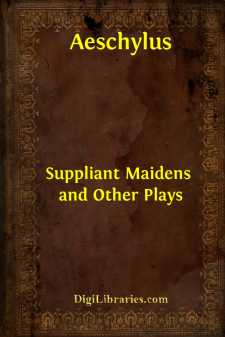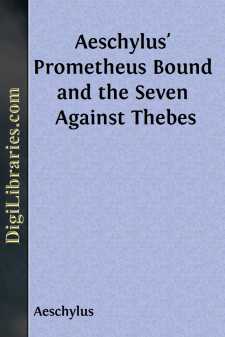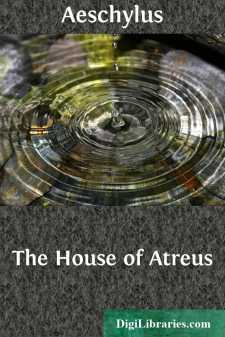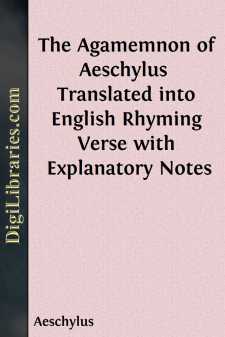Categories
- Antiques & Collectibles 13
- Architecture 36
- Art 48
- Bibles 22
- Biography & Autobiography 813
- Body, Mind & Spirit 142
- Business & Economics 28
- Children's Books 17
- Children's Fiction 14
- Computers 4
- Cooking 94
- Crafts & Hobbies 4
- Drama 346
- Education 46
- Family & Relationships 57
- Fiction 11829
- Games 19
- Gardening 17
- Health & Fitness 34
- History 1377
- House & Home 1
- Humor 147
- Juvenile Fiction 1873
- Juvenile Nonfiction 202
- Language Arts & Disciplines 88
- Law 16
- Literary Collections 686
- Literary Criticism 179
- Mathematics 13
- Medical 41
- Music 40
- Nature 179
- Non-Classifiable 1768
- Performing Arts 7
- Periodicals 1453
- Philosophy 64
- Photography 2
- Poetry 896
- Political Science 203
- Psychology 42
- Reference 154
- Religion 513
- Science 126
- Self-Help 84
- Social Science 81
- Sports & Recreation 34
- Study Aids 3
- Technology & Engineering 59
- Transportation 23
- Travel 463
- True Crime 29
Suppliant Maidens and Other Plays
by: Aeschylus
Description:
Excerpt
DEDICATION
Take thou this gift from out the grave of Time.
The urns of Greece lie shattered, and the cup
That for Athenian lips the Muses filled,
And flowery crowns that on Athenian hair
Hid the cicala, freedom's golden sign,
Dust in the dust have fallen. Calmly sad,
The marble dead upon Athenian tombs
Speak from their eyes "Farewell": and well have fared
They and the saddened friends, whose clasping hands
Win from the solemn stone eternity.
Yea, well they fared unto the evening god,
Passing beyond the limit of the world,
Where face to face the son his mother saw,
A living man a shadow, while she spake
Words that Odysseus and that Homer heard,—
I too, O child, I reached the common doom,
The grave, the goal of fate, and passed away.
—Such, Anticleia, as thy voice to him,
Across the dim gray gulf of death and time
Is that of Greece, a mother's to a child,—
Mother of each whose dreams are grave and fair—
Who sees the Naiad where the streams are bright
And in the sunny ripple of the sea
Cymodoce with floating golden hair:
And in the whisper of the waving oak
Hears still the Dryad's plaint, and, in the wind
That sighs through moonlit woodlands, knows the horn
Of Artemis, and silver shafts and bow.
Therefore if still around this broken vase,
Borne by rough hands, unworthy of their load,
Far from Cephisus and the wandering rills,
There cling a fragrance as of things once sweet,
Of honey from Hymettus' desert hill,
Take thou the gift and hold it close and dear;
For gifts that die have living memories—
Voices of unreturning days, that breathe
The spirit of a day that never dies.
Io, the daughter of Inachus, King of Argos, was beloved of Zeus. But Hera was jealous of that love, and by her ill will was Io given over to frenzy, and her body took the semblance of a heifer: and Argus, a many-eyed herdsman, was set by Hera to watch Io whithersoever she strayed. Yet, in despite of Argus, did Zeus draw nigh unto her in the shape of a bull. And by the will of Zeus and the craft of Hermes was Argus slain. Then Io was driven over far lands and seas by her madness, and came at length to the land of Egypt. There was she restored to herself by a touch of the hand of Zeus, and bare a child called Epaphus. And from Epaphus sprang Libya, and from Libya, Belus; and from Belus, Aegyptus and Danaus. And the sons of Aegyptus willed to take the daughters of Danaus in marriage. But the maidens held such wedlock in horror, and fled with their father over the sea to Argos; and the king and citizens of Argos gave them shelter and protection from their pursuers.
THE SUPPLIANT MAIDENS
DRAMATIS PERSONAE
DANAUS, THE KING OF ARGOS, HERALD OF AEGYPTUS.
Chorus of the Daughters of Danaus. Attendants.
Scene. —A sacred precinct near the gates of Argos: statue and shrines of Zeus and other deities stand around.
CHORUS
ZEUS!...





